- Details
- Hits: 6397
Station: Wixom, MI
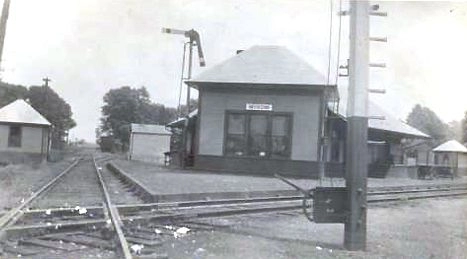
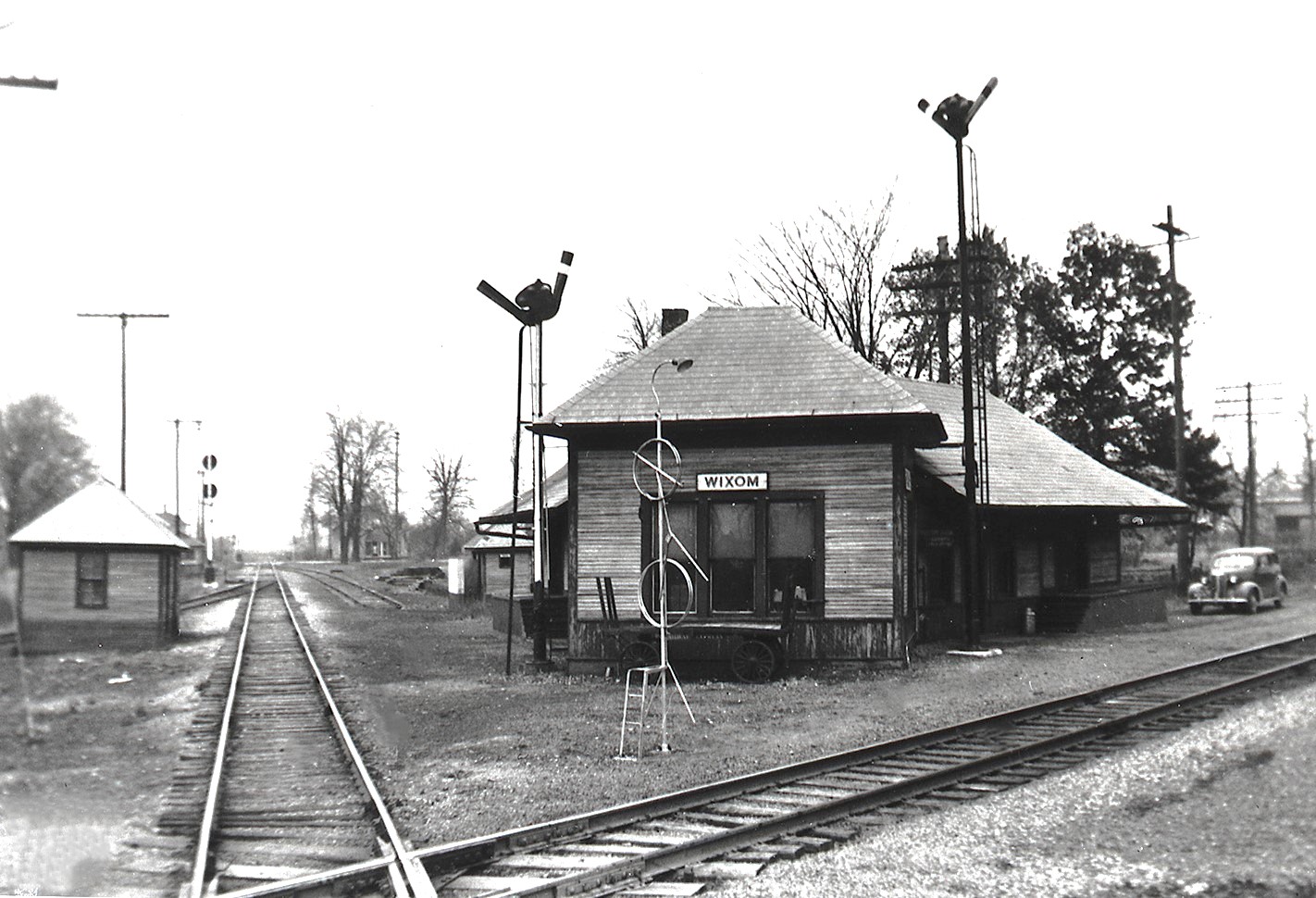
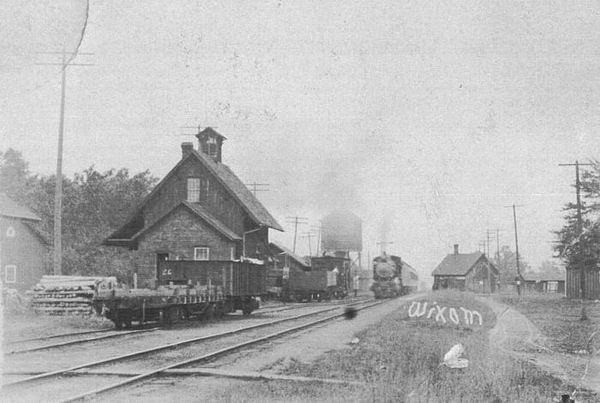
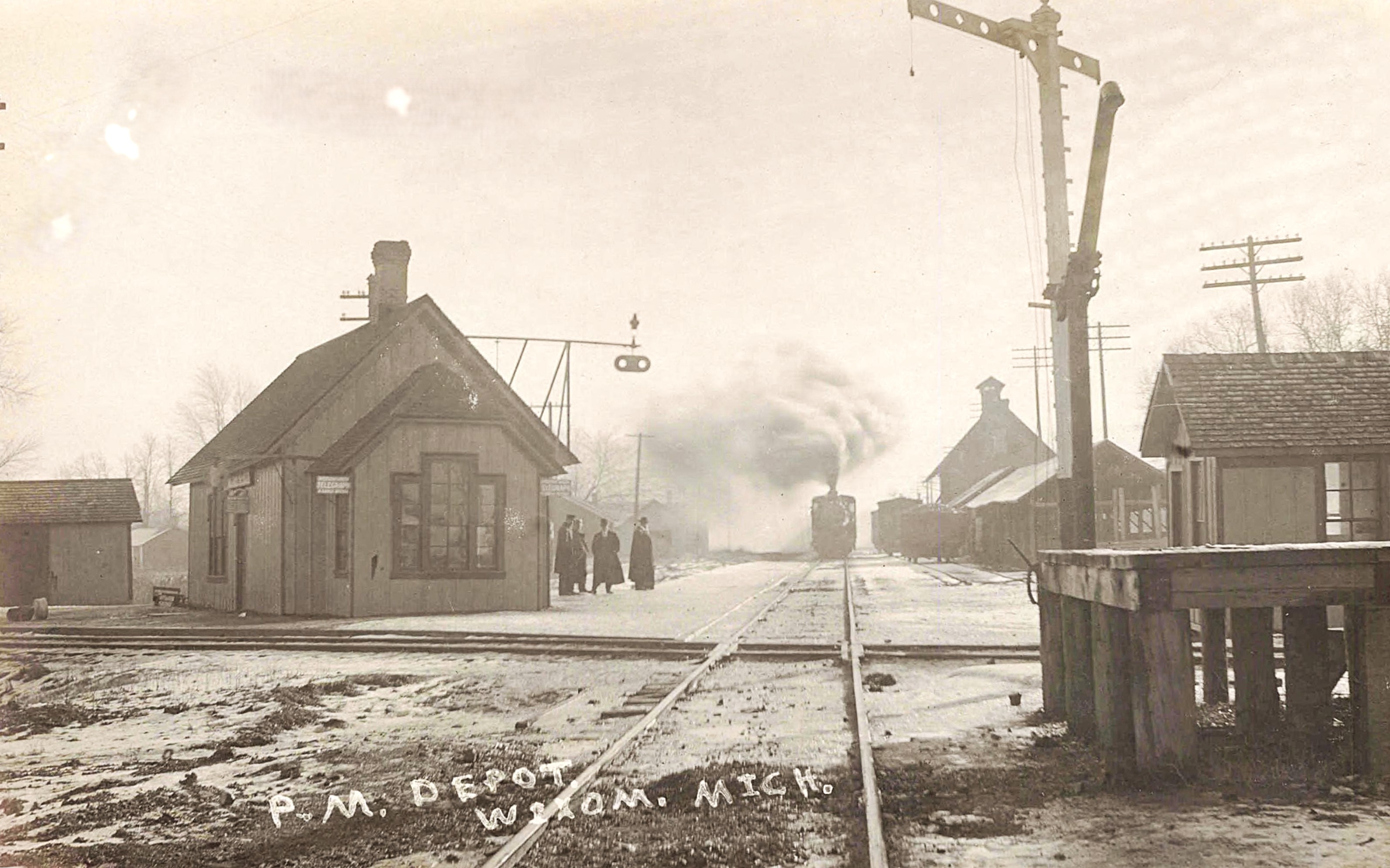
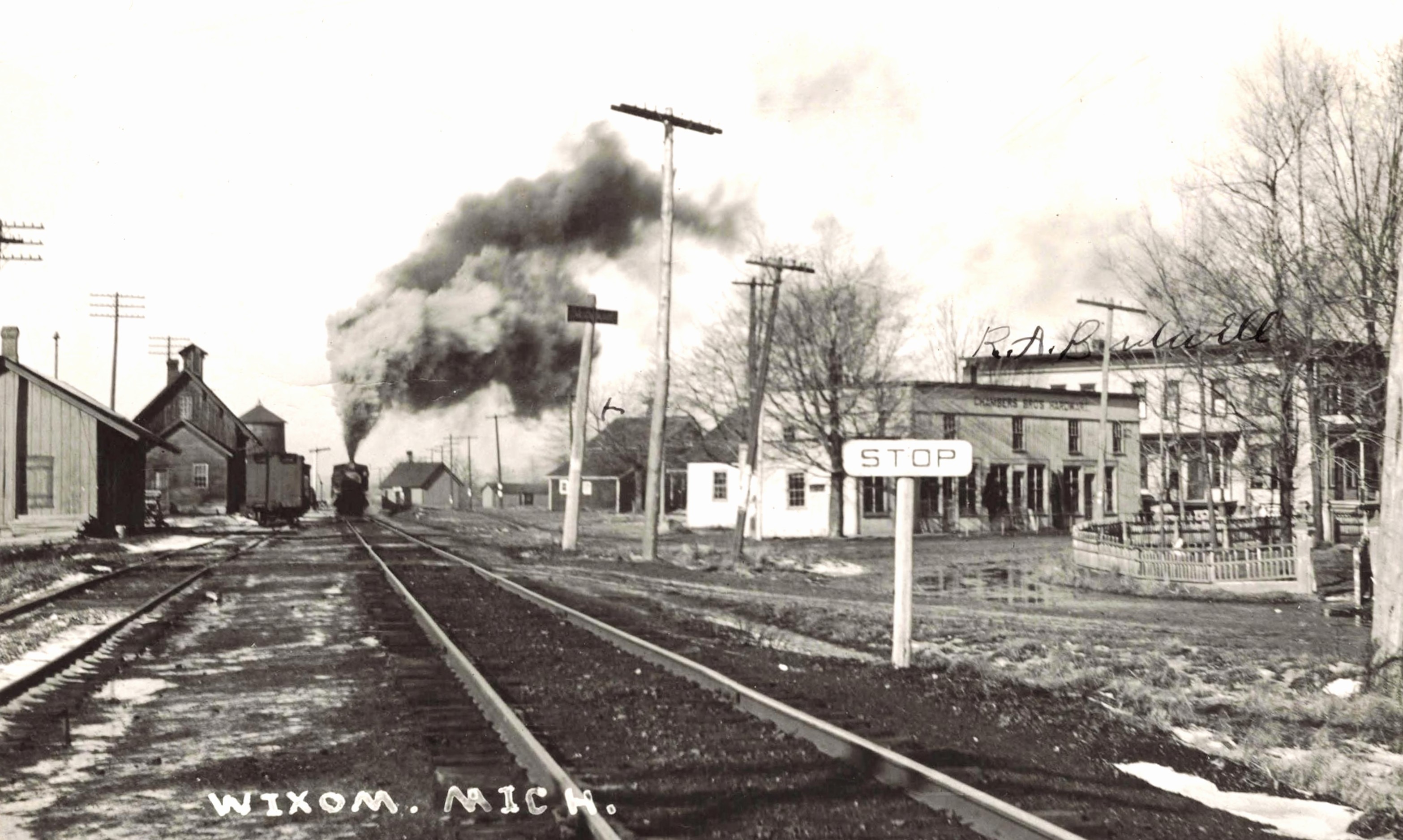
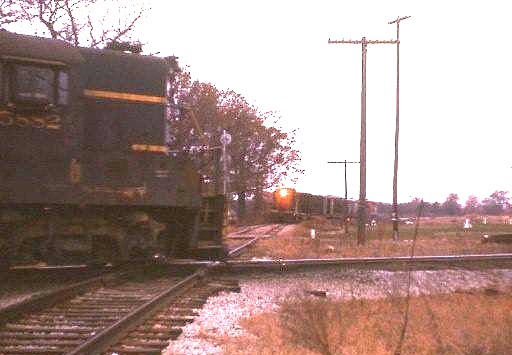
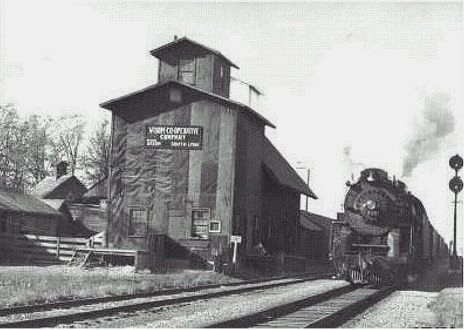
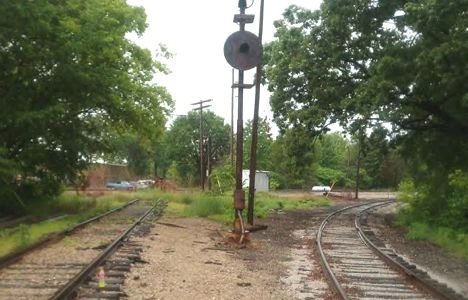
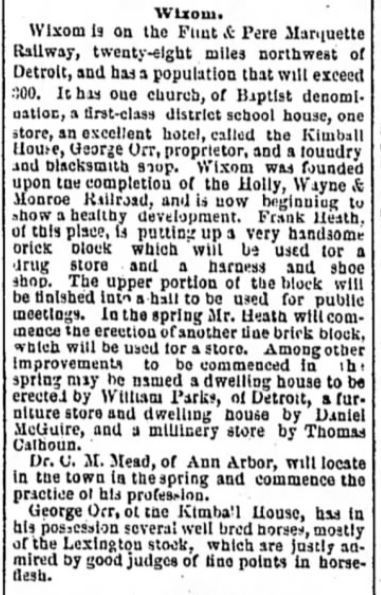
Wixom is located in southwest Oakland County and was at the crossing of two railroad lines. The former Pere Marquette (later C&O/CSX) line from Plymouth to Flint crossed the Grand Trunk Western's Jackson Branch just north of what is now Pontiac Trail.
See Wixom - Lincoln Yard for additional information about the C&O yard which served the Ford Motor Wixom Assembly Plant.
Image info: Top, an old photo of the Wixom depot which served both the Pere Marquette and the Grand Trunk Western railroads. The control at the right is believed to have been used to change a target or ball signal at the top of the pole which controlled access to cross the diamond. [Alan Loftis collection]. 2nd photo, a similar but more detailed view of the crossing at Wixom. Note the train order iron man which was used to deliver hoop train orders to PM trains. 3rd photo, a Pere Marquette passenger train leaves the Wixom depot; 4th, an old photo of an approaching northbound Pere Marquette train approaching the Wixom depot. The crossing arm, known as a target signal, controls the crossing. [UMB]. 5th photo, a view of a southbound Pere Marquette train at the crossing. A northbound "stop" sign is shown in the photo, which reminds engineers of the Michigan Railroad Commission requirement that all trains must stop at non-interlocked railroad crossings, even if a manual target was present. [UML]. 6th image, an eastbound Grand Trunk Jackson Branch waits for the home signal at Wixom, while a northbound C&O crosses the diamond heading to Flint. 1970's. [Doug Hefty collection]. 7th image, a Pere Marquette "Berkshire" steam locomotive leads a freight train across the GTW diamond at Wixom. The elevator is on the left. 7th photo, the remnants of the Wixom interlocking looking west on the former Grand Trunk Western. The GTW Jackson branch is at the left (pulled up before the crossing). The old searchlight signal protecting the crossing is still in place. The track to the right is the Coe Rail/CSX interchange wye. In 2004. [Mike Tabone] 8th image is an article from the Detroit Free Press in 1874]
Notes
The crossing at Wixom was established about 1883 when the GT built their "air line" from Richmond to Jackson. In the early years, the crossing was controlled by a target or ball signal.
Time Line
1871. Two thousand two hundred bushels of wheat were purchased and shipped at Wixom on Tuesday. [DFP-1871-1008]
1881. Wixom has a telegraph operator of but 6 years of age. His name is Chauncey Ranch. He is a son of John R. Ranch, the Flint & Pere Marquette station agent at the place. Young Ranch learned the Morse alphabet when but 4 years of age, and has continued to operate ever since on a private line that runs from the depot to his father's house, about a quarter of a mile distant. He is a bright, attractive lad, and certainly possesses a most remarkable faculty for one so young. [DFP-1881-0828]
1885. A horse stolen from F.R. Erwin of Wixom was recovered in Howell by Philip Parker and Frank Vowles, members of the Southwestern Oakland County Horse Thief Association. Edgar Beebe, of Parshalville, who brought his girl to the circus with the horse, was arrested this evening. [DFP-1885-0802]
1895. A Wixom lady who expected a dispatch from her husband stepped into the telegraph office. Soon one of the instruments began to tick. "Oh, yes" she declared, "that's my husband. I know him by his stutter." [CCA-1895-0411]
1898: Wixom was a regular station stop on the F&PM with a daytime agent at the depot. There were also coaling facilities here at that time.
1901. December 28. Willard Wixom, a prominent businessman, was killed by the fast express on the Pere Marquette railroad, going south about 10 o'clock. The accident happened at the crossing a few rods south of the village of Wixom, a place named for Mr. Wixom. His horse was also killed. He was mangled almost beyond recognition. [Sebewaing Blade-1901-1228]
1903. March. At 2 o'clock yesterday morning a young man entered the depot at Wixom. A moment later the operator went for a pail of water. When he returned he found a hole in a window of the office and a bag containing $5 missing from the safe. The operator pursued the burglar, firing several shots, but was unable to overtake him. [DFP-1903-0312]
1905. November. Matthew Dean, a well known and popular PM engineer was taking No. 58 freight to Detroit. Near Wixom he fell from his engine and must have fallen on the rails so that many wheels may have passed over his arms. He was not missed by the fireman until the train had run about a mile. Dean managed to make his own way to the depot at Wixom where he came upon the horrified operator, who quickly sent in the necessary calls and did all that could be done under the circumstances. Both hands were practically cut off and hanging tendons were mangled. He was taken to Detroit. [SAG-1905-1116]
1917. The GTW had an agent here as well as a day operator. This was a joint agency with the PM. [TRT]
1927. The operator in the depot controlled the signals at the crossing. This was staffed around the clock. The agent-operators on the day and evening shaft were paid by both railroads, each at a rate of 33¢ and 31¢ per hour. These operators received pay from both railroads. The night operator was paid exclusively by the PM at a rate of 58¢ per hour. This was an unusual arrangement, as most crossing towers were staffed by one railroad, and the other railroad settled up the costs each year. Apparently, the GTW didn't run on the midnight shift and didn't want to pay for that time period. [PMTA]
1928. An ICC examiner recommends that the application by the Pere Marquette to reach Pontiac be denied. The PM has proposed a 17 mile long line from Wixom to Pontiac, and a belt line seven miles long on the northern and eastern sides of the city. [MCH-1928-0316]
1978. Quite a few changes took place in 1978. Chessie went on a building spree to increase capacity. The Wixom siding was extended on the north end. [DH]
Industry
- Ford Wixom Assembly Plant (now closed)
Bibliography
The following sources are utilized in this website. [SOURCE-YEAR-MMDD-PG]:
- [AAB| = All Aboard!, by Willis Dunbar, Eerdmans Publishing, Grand Rapids ©1969.
- [AAN] = Alpena Argus newspaper.
- [AARQJ] = American Association of Railroads Quiz Jr. pamphlet. © 1956
- [AATHA] = Ann Arbor Railroad Technical and Historical Association newsletter "The Double A"
- [AB] = Information provided at Michigan History Conference from Andrew Bailey, Port Huron, MI

